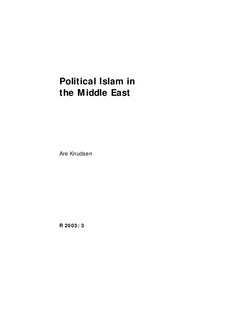| dc.description.abstract | This report provides an overview of the political Islam in
the Middle East, with a special emphasis on the Islamic
resurgence in the Levant (Egypt, Israel, Jordan, Lebanon,
Palestine and Syria). Following an introduction to the
ideological roots of present-day Islamist movements, the
report examines the prospects for popular democracy
amidst widespread political violence. In brief, the report
shows that Islam need not be incompatible with democracy
and that there is a tendency to neglect the fact that many
Middle Eastern countries have been engaged in a brutal
suppression of Islamist movements, causing them to take up
arms against the state. In the third section the report
reviews some of the theories used to explain the Islamic
revival and discusses their empirical significance. The
conclusion argues in favour of moving beyond the “gloom
and doom” approach that portrays Islamism as an
illegitimate political expression and a potential threat to
the West (“Old Islamism”). Instead, there is an urgent need
for a more nuanced understanding of the current
democratisation of the Islamist movements that is now
taking place throughout the Middle East (“New
Islamism”). | |
